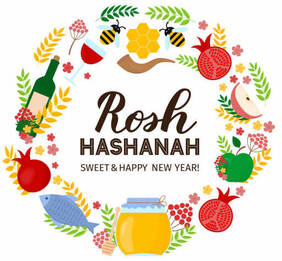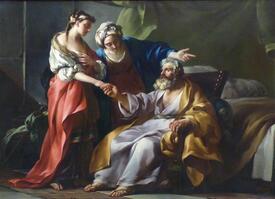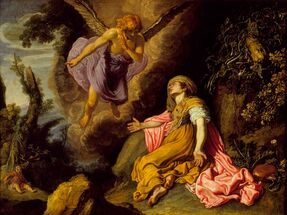
This weekend's arrival of Rosh Hashanah 5784 interrupts the weekly Torah cycle in favor of the New Year's special Torah reading for P. Vayera in Genesis 21-22. It's about the Israelite (later Jewish) lineage began by dividing from the Arab (later Muslim) lineage, and how relationship with God deepened and was put to the test in its wake.
The story is a fascinating one, full of intrigue and drama – as many beginnings are. It comes every Rosh Hashanah, itself a new beginning when our own relationships with God are deepened and put to the test.
The story is a fascinating one, full of intrigue and drama – as many beginnings are. It comes every Rosh Hashanah, itself a new beginning when our own relationships with God are deepened and put to the test.
 "Hagar to Abraham with Sarah," painted by Joseph-Marie Vien (1749)
"Hagar to Abraham with Sarah," painted by Joseph-Marie Vien (1749) Pre-2023 Shir Ami members are familiar with The Akeidah / Binding of Isaac in Genesis 22, the traditional Torah reading for Rosh Hashanah's second day. The first day's Torah reading in Genesis 21, which we'll read together on September 16 (Rosh Hashanah 1), is the prequel of how Isaac came to be – and with him the fact of an Israelite / Jewish legacy at all.
Without Isaac, Abraham would have no Israelite descendants at all. So it's no exaggeration to say that, but for Isaac, there'd be no Israelite patriarchs or matriarchs, no Israelites and no Judaism. That's why this Torah excerpt is read on Rosh Hashanah day 1, which celebrates new beginnings including Jewish peoplehood.
But why wouldn't Abraham have Israelite descendants without Isaac? After all, Abraham was a would-be Israelite, so wouldn't any of his descendants fit the bill? Torah's short answer is no.
The Back Story
Abraham's wife Sarah originally couldn't have children. (While the patriarchy often holds that Sarah was barren, Jewish mystics hold that it was Abraham who was infertile until he was spiritually "opened" at his circumcision.) Thus, to fulfill God's promise that Abraham's descendants would be as numerous as the stars in the sky and sand by the sea, the couple adopted a Canaanite concubinage practice. (In Mideast concubinage, the husband has sex with the woman's maidservant, who gives birth on the woman's knees and thereby bears her a child whom the maidservant nurses.)
Sarah's maidservant was the Egyptian woman Hagar (הגר - "the stranger": we'll get to that), who birthed a firstborn son named Ishmael (ישמעאל - "God will hear": we'll get to that). Only then did Sarah become pregnant by Abraham and have a son named Isaac (יצחק - for Sarah's exclamation that everyone "will laugh" or "will joke" about her pregnancy in the couple's old age: we'll get to that, too).
Based on Canaanite custom that would shape Israelite primogeniture, the first-born Ishmael would hold the birthright and the parents' favor – and that's where the problems began.
Torah's First Take, and Rosh Hashanah's First Day
The Rosh Hashanah day 1 Torah reading opens with Sarah giving birth to Isaac. Like the older Ishmael, Isaac is circumcised at eight days and eventually weaned. And then (Gen. 21:9-13):
Without Isaac, Abraham would have no Israelite descendants at all. So it's no exaggeration to say that, but for Isaac, there'd be no Israelite patriarchs or matriarchs, no Israelites and no Judaism. That's why this Torah excerpt is read on Rosh Hashanah day 1, which celebrates new beginnings including Jewish peoplehood.
But why wouldn't Abraham have Israelite descendants without Isaac? After all, Abraham was a would-be Israelite, so wouldn't any of his descendants fit the bill? Torah's short answer is no.
The Back Story
Abraham's wife Sarah originally couldn't have children. (While the patriarchy often holds that Sarah was barren, Jewish mystics hold that it was Abraham who was infertile until he was spiritually "opened" at his circumcision.) Thus, to fulfill God's promise that Abraham's descendants would be as numerous as the stars in the sky and sand by the sea, the couple adopted a Canaanite concubinage practice. (In Mideast concubinage, the husband has sex with the woman's maidservant, who gives birth on the woman's knees and thereby bears her a child whom the maidservant nurses.)
Sarah's maidservant was the Egyptian woman Hagar (הגר - "the stranger": we'll get to that), who birthed a firstborn son named Ishmael (ישמעאל - "God will hear": we'll get to that). Only then did Sarah become pregnant by Abraham and have a son named Isaac (יצחק - for Sarah's exclamation that everyone "will laugh" or "will joke" about her pregnancy in the couple's old age: we'll get to that, too).
Based on Canaanite custom that would shape Israelite primogeniture, the first-born Ishmael would hold the birthright and the parents' favor – and that's where the problems began.
Torah's First Take, and Rosh Hashanah's First Day
The Rosh Hashanah day 1 Torah reading opens with Sarah giving birth to Isaac. Like the older Ishmael, Isaac is circumcised at eight days and eventually weaned. And then (Gen. 21:9-13):
| וַתֵּ֨רֶא שָׂרָ֜ה אֶֽת־בֶּן־הָגָ֧ר הַמִּצְרִ֛ית אֲשֶׁר־יָלְדָ֥ה לְאַבְרָהָ֖ם מְצַחֵֽק׃ וַתֹּ֙אמֶר֙ לְאַבְרָהָ֔ם גָּרֵ֛שׁ הָאָמָ֥ה הַזֹּ֖את וְאֶת־ בְּנָ֑הּ כִּ֣י לֹ֤א יִירַשׁ֙ בֶּן־הָאָמָ֣ה הַזֹּ֔את עִם־בְּנִ֖י עִם־יִצְחָֽק׃ וַיֵּ֧רַע הַדָּבָ֛ר מְאֹ֖ד בְּעֵינֵ֣י אַבְרָהָ֑ם עַ֖ל אוֹדֹ֥ת בְּנֽוֹ׃ וַיֹּ֨אמֶר אֱלֹהִ֜ים אֶל־אַבְרָהָ֗ם אַל־יֵרַ֤ע בְּעֵינֶ֙יךָ֙ עַל־הַנַּ֣עַר וְעַל־אֲמָתֶ֔ךָ כֹּל֩ אֲשֶׁ֨ר תֹּאמַ֥ר אֵלֶ֛יךָ שָׂרָ֖ה שְׁמַ֣ע בְּקֹלָ֑הּ כִּ֣י בְיִצְחָ֔ק יִקָּרֵ֥א לְךָ֖ זָֽרַע׃ וְגַ֥ם אֶת־בֶּן־הָאָמָ֖ה לְג֣וֹי אֲשִׂימֶ֑נּוּ כִּ֥י זַרְעֲךָ֖ הֽוּא׃ | Sarah saw the son whom Hagar the Egyptian had borne to Abraham m'tzaheik. She said to Abraham, “Cast out that handmaiden and her son, for the son of that handmaiden will not share in the inheritance with my son Isaac.” The matter greatly distressed Abraham, for it concerned his son. God said to Abraham, “Do not be distressed over the boy or your maidservant; whatever Sarah tells you, do as she says, for it is by Isaac that your descendants will be. Also I will make a nation of the son of the handmaiden, for he is your seed." |
The next morning, Abraham banishes Hagar and Ishamel. (We'll come back to them shortly.)
It's a rough story. It's rough to discover that Israelite ancestry is far from "clean" and upright by our modern lights. It's rough to encounter that truth on Rosh Hashanah, of all days. It's rough to interpret the story because the reddened word מְצַחֵֽק / m'tzaheik could equally mean either "playing" (perhaps the brothers were getting along) or "teasing" (perhaps Sarah was standing up for "her" son against the elder Ishmael's bullying). And it's rough to approach this story without baggage about God, Jewish identity, the Mideast situation, antisemitism and religion itself.
Perhaps the baggage itself is part of the point, and the rabbinic wisdom of excerpting this Torah reading on Rosh Hashanah day 1. This story forces us to come to terms anew, every year, with who we are, who we are relative to ancestry and community, what it means to include or exclude, and what all of that's about relative to the One we call God. Essentially, the moral quandary, the questions and the yearnings they voice are the launching point for Jewish identity itself.
And the "baggage" that seems to get in the way? Nope: the "baggage" turns out to be the raw stuff of spiritual becoming – as it almost always is.
I'll reserve more comment for services on Rosh Hashanah day 1, when we'll read these words together along with Jews around the world. For now, let this Torah portion get us thinking about who we are and want to be. After all, we are the stars in the sky and sand at the sea for whom Issac's birth comes to fulfill a promise. It's for us to take our complex legacy and make it what we will – for ourselves, each other, continuity and a world that needs every bit of social justice and collective healing within our power to manifest.
Hagar and Ishmael: Distance and Proximity
Torah's God kept the promise to Abraham, but by human lights it was a close call. Abraham gave Hagar bread and water, and cast her and Ishmael into the desert. They wandered in the area of the southern Israeli city of Beersheva. And then (Gen. 21:15-19):
It's a rough story. It's rough to discover that Israelite ancestry is far from "clean" and upright by our modern lights. It's rough to encounter that truth on Rosh Hashanah, of all days. It's rough to interpret the story because the reddened word מְצַחֵֽק / m'tzaheik could equally mean either "playing" (perhaps the brothers were getting along) or "teasing" (perhaps Sarah was standing up for "her" son against the elder Ishmael's bullying). And it's rough to approach this story without baggage about God, Jewish identity, the Mideast situation, antisemitism and religion itself.
Perhaps the baggage itself is part of the point, and the rabbinic wisdom of excerpting this Torah reading on Rosh Hashanah day 1. This story forces us to come to terms anew, every year, with who we are, who we are relative to ancestry and community, what it means to include or exclude, and what all of that's about relative to the One we call God. Essentially, the moral quandary, the questions and the yearnings they voice are the launching point for Jewish identity itself.
And the "baggage" that seems to get in the way? Nope: the "baggage" turns out to be the raw stuff of spiritual becoming – as it almost always is.
I'll reserve more comment for services on Rosh Hashanah day 1, when we'll read these words together along with Jews around the world. For now, let this Torah portion get us thinking about who we are and want to be. After all, we are the stars in the sky and sand at the sea for whom Issac's birth comes to fulfill a promise. It's for us to take our complex legacy and make it what we will – for ourselves, each other, continuity and a world that needs every bit of social justice and collective healing within our power to manifest.
Hagar and Ishmael: Distance and Proximity
Torah's God kept the promise to Abraham, but by human lights it was a close call. Abraham gave Hagar bread and water, and cast her and Ishmael into the desert. They wandered in the area of the southern Israeli city of Beersheva. And then (Gen. 21:15-19):
| וַיִּכְל֥וּ הַמַּ֖יִם מִן־הַחֵ֑מֶת וַתַּשְׁלֵ֣ךְ אֶת־הַיֶּ֔לֶד תַּ֖חַת אַחַ֥ד הַשִּׂיחִֽם׃ וַתֵּ֩לֶךְ֩ וַתֵּ֨שֶׁב לָ֜הּ מִנֶּ֗גֶד הַרְחֵק֙ כִּמְטַחֲוֵ֣י קֶ֔שֶׁת כִּ֣י אָֽמְרָ֔ה אַל־אֶרְאֶ֖ה בְּמ֣וֹת הַיָּ֑לֶד וַתֵּ֣שֶׁב מִנֶּ֔גֶד וַתִּשָּׂ֥א אֶת־קֹלָ֖הּ וַתֵּֽבְךְּ׃ וַיִּשְׁמַ֣ע אֱלֹהִים֮ אֶת־ק֣וֹל הַנַּ֒עַר֒ וַיִּקְרָא֩ מַלְאַ֨ךְ אֱלֹהִ֤ים ׀ אֶל־הָגָר֙ מִן־הַשָּׁמַ֔יִם וַיֹּ֥אמֶר לָ֖הּ מַה־לָּ֣ךְ הָגָ֑ר אַל־תִּ֣ירְאִ֔י כִּֽי־שָׁמַ֧ע אֱלֹהִ֛ים אֶל־ק֥וֹל הַנַּ֖עַר בַּאֲשֶׁ֥ר הוּא־ שָֽׁם׃ ק֚וּמִי שְׂאִ֣י אֶת־הַנַּ֔עַר וְהַחֲזִ֥יקִי אֶת־יָדֵ֖ךְ בּ֑וֹ כִּֽי־לְג֥וֹי גָּד֖וֹל אֲשִׂימֶֽנּוּ׃ וַיִּפְקַ֤ח אֱלֹהִים֙ אֶת־עֵינֶ֔יהָ וַתֵּ֖רֶא בְּאֵ֣ר מָ֑יִם וַתֵּ֜לֶךְ וַתְּמַלֵּ֤א אֶת־הַחֵ֙מֶת֙ מַ֔יִם וַתַּ֖שְׁקְ אֶת־הַנָּֽעַר׃ | When the water was done from the flask, she tashleikh the boy under one of the bushes. She went and sat at a bowshot's distance, saying "Let me not see the child die!” – and she sat opposite him and sobbed. God heard the voice of the boy: an angel of God called to Hagar from heaven, saying to her, “What's with you, Hagar? Do not fear, for God heard the voice of the boy where he is. Get up. Lift up the boy. Take his hand in yours, for I will make a great nation of him.” God opened her eyes and she saw a well of water. She went and filled the flask with water, and gave the boy to drink. |
 "An angel appears and reveals a well of water to Hagar," painted by Pieter Lastman (1614).
"An angel appears and reveals a well of water to Hagar," painted by Pieter Lastman (1614). So much symbolism here. Hagar (the stranger) literally did tashlikh with her son under a bush. She distanced herself, symbolically from both her greatest love and the greatest source of pain. Her distance – the "length of a bowshot" – alludes to the Hebrew word for sin (het, an archery term for the distance of a bowshot from its mark). She did not want to see (and who could blame her). God heard the boy (fulfilling the meaning of the boy's name), and sent an angel to Hagar (not even Sarah got an angel). God opened Hagar's eyes, perhaps occluded by pain, and she saw a well of water that presumably already was there (in Jewish mysticism, a well of water is symbolic of Shekhinah, the divine presence).
Symbolically speaking, what's really happening here is this: we humans always are inclined to distance ourselves from pain, fear, othering and suffering. Our psycho-emotional efforts to outrun them and distance ourselves from them tend to drive most human misbehavior that we call "sin." We do tashlikh not only to cast away, but also first to become deeply close: only by engaging can we genuinely change. Meanwhile, the One we call God hears and sees, and often there are messages for us to find our way back. When we see with this higher vision, we tend to see things that already were there but to which we were blinded.
These, too, are part of our Rosh Hashanah journey. Sometimes it's easier to see them first in someone else (here, Hagar, the stranger) than in ourselves. Hagar is a prophet for us, at the very time that Jews worldwide commemorate the new year and Jewish identity. There'll be more about that on Rosh Hashanah, too.
From my heart to yours, I send blessings to you and your loved ones for a vision quest worthy of our highest hopes and aspirations. L'shanah tovah um'tukah.
Symbolically speaking, what's really happening here is this: we humans always are inclined to distance ourselves from pain, fear, othering and suffering. Our psycho-emotional efforts to outrun them and distance ourselves from them tend to drive most human misbehavior that we call "sin." We do tashlikh not only to cast away, but also first to become deeply close: only by engaging can we genuinely change. Meanwhile, the One we call God hears and sees, and often there are messages for us to find our way back. When we see with this higher vision, we tend to see things that already were there but to which we were blinded.
These, too, are part of our Rosh Hashanah journey. Sometimes it's easier to see them first in someone else (here, Hagar, the stranger) than in ourselves. Hagar is a prophet for us, at the very time that Jews worldwide commemorate the new year and Jewish identity. There'll be more about that on Rosh Hashanah, too.
From my heart to yours, I send blessings to you and your loved ones for a vision quest worthy of our highest hopes and aspirations. L'shanah tovah um'tukah.

 RSS Feed
RSS Feed